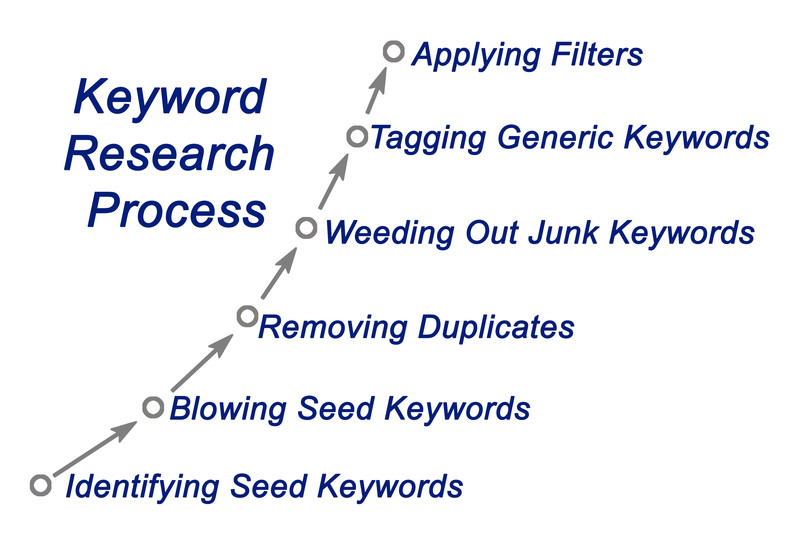The world of SEO is changing at lightning speed and medical businesses must use strategic medical SEO solutions to stay ahead of competitors. Healthcare consumers’ usage and expectations, and Google algorithm updates necessitate continuous adjustments in your SEO campaigns. SEO is the soul of any online business and one of the most important ways to gain and maintain a competitive advantage within the medical industry is to watch out for even subtle changes in SEO trends and make the required changes. Keyword research is one of the stable SEO elements. Keywords are an important component of any SEO strategy. SEO keywords make it possible for people to find your site via search engines. In other words, a website well-optimized for search engines would contain words and phrases most likely to be used by visitors. Selecting the right keywords is fundamental to success whether you are executing a PPC campaign, or organic SEO.
The right keywords and keyword phrases help to optimize your website, and also give you the power to control which searches you rank for. Adjusting your keywords gives you the power to change your campaign over time. So choosing the right keywords is essential. You may ask, in this age of Machine Learning, RankBrain and other technological advancements of present day search engines, are keywords and keyword research still relevant? The answer is yes, keyword research and ranking still apply today even with Google’s semantic search, and will help improve your online visibility. Keywords are important because they help Google understand the context. They should be as natural as possible; they are important because they give you a focus. The right keywords and keyword phrases will help you remain authoritative, trustworthy, and relevant.
Before deciding on the keywords, make sure that you also consider your SEO goals. Firstly be specific about:
- How fast you want to see results because sometimes it may take months before you start seeing results. If you need results faster than that, then choose higher-volume keywords with lower-competition.
- How important your audience need to be. Determine if you are flexible as regards your audience or whether you are sharply focused on a specific audience.
- The type of traffic you are seeking. Consider whether you are focusing on increasing brand awareness or interested primarily in selling your products.
Once your goals are clear, make sure that you have a proper balance between head and long tail keywords. Long-tail keywords are longer than conversational phrases, and have lower traffic and competition. These are better for short-term and quick results. Head keywords are short and enjoy higher traffic and higher competition. They are ideal for long-term, traffic-oriented strategies. A proper combination of both will help you attain the best results. So, for that a preliminary research is important.
- Have a rough idea about what people might search for related to your business. Identify a few broad categories of searches and both head and long-tail keywords they might use to find you.
- Use online tools to help you discover more keywords and topic ideas based on preliminary ideas. Moz Keyword Explorer tool can help you come up with ideas and give you stats on the keywords themselves.
- Export all keywords identified into a master spreadsheet to quickly compare them and sort by different fields.
- Once the master list is done, then focus on the following things:
- Volume: Search volume is the number of times a particular phrase is searched for. It is a convenient way to find out how much traffic you will receive from a specific query. However, the volume tends to fluctuate over time.
- Importance: Consider the importance of each keyword to your brand. It may have high traffic and low competition.
- Competition: You must know the level of competition for each keyword. The highest volume keywords also tend to have the highest amount of competition. The higher the competition, the harder the ranking will be. So it is important to strike a balance between the two.
- Ranking: Always track your present ranking to know your position among other competitors.
After all these steps, you have a list of keywords that have the highest chances of bringing you the results you are looking for. Choose a handful of keywords from this list to optimize.
Keywords and keyword research are significant with regard to “relevance,” a very important consideration now. It’s true that voice search is increasing, but in the B2B world, desktop is the more popular option with 85 to 90% of B2B users using desktops for search. With voice search, people prefer to ask more natural questions or conversational speech, which emphasizes the need to use natural keywords and keyword phrases. Machine learning or AI tools and NLP (natural language processing) also need data input, and this is done via content, keywords, and context.
Keyword research and use should steer your overall content optimization strategy. Keyword research should ideally take into consideration what users are searching for, and the way Google and other leading search engines think about keywords. A Long Island SEO company providing healthcare website design service would be able to help healthcare marketers leverage the existing consumer requirements, and utilize the knowledge to provide the best possible user experience. This in turn will bring higher rankings, improved traffic, and a higher ROI.





